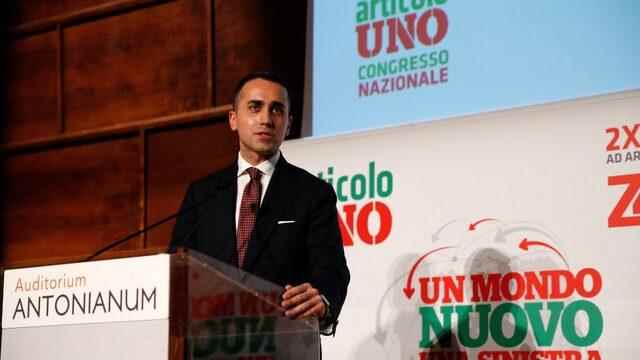The 5 Star Movement has been on the agenda lately due to the loss of support, internal conflicts and differences in positions on the Ukraine war. Giuseppe Conte, the leader of the movement, which was included in the wide-participation coalition government led by Technocrat Prime Minister Mario Draghi, was against the government’s arms support to Ukraine.
MAJORITY OF THE PEOPLE AGAINST WEAPON SUPPORT
Conte argues that providing arms support to Ukraine will further prolong the war. Polls conducted in Italy also show that the majority of the people oppose support for weapons.
The disagreement between Conte, who was in the prime minister’s seat before Draghi, and Foreign Minister Luigi Di Maio, one of the important figures of the 5 Star Movement, on arms aid has reached its peak in the last few days.
Di Maio accused the 5 Star administration of acting “immature” and gave a message to avoid decisions against the EU and NATO. After this skirmish, Di Maio’s dismissal from the movement came to the agenda at the end of last week.
“WAR IS NOT A MEDIAATIC SHOW”
After the disagreement within the party could not be resolved, Foreign Minister Luigi Di Maio announced on Tuesday evening that he was leaving the 5 Star Movement.
According to the Italian press, Di Maio will form a new group in the parliament together with some deputies and senators who left the movement.
It is expected that around 50 parliamentarians from the 5 Star Movement will be involved in the group called “Together for the Future” in the first stage.
In a statement this evening, Di Maio accused his former party of being irresponsible and endangering the stability of the government in order to boost falling popular support.
Stating that Europe should act in unity while Russia’s occupation of Ukraine continues, Di Maio said, “We cannot stand on the wrong side of history, we must stand by the free world. War is not a media show.”
‘TWO PERIOD’ RULE EFFECT
On the other hand, there are those who argue that there are other reasons behind Di Maio and his supporters’ break with the 5 Star Movement.
The bylaws of the 5 Star Movement, which was born as an anti-system populist movement that is distant from the EU, stipulates that the parliamentarians serve a maximum of two terms.
Di Maio, who first entered the parliament in 2013 and was re-elected in 2018, would not be a candidate in the elections scheduled for next year if the party charter did not change. There were ongoing discussions within the movement to change this rule.
Luigi Di Maio was the political leader of the 5 Star Movement before Conte. With the departure of Di Maio, one of the influential figures of the party, and his supporters, the future of 5 Stars was also discussed.
“5 STAR MOVEMENT DID TODAY”
The 5 Star Movement, which was the largest party with 32 percent of the votes in the 2018 general elections, is far from this support today. According to the latest polls, the movement is the fourth party with around 12 percent support today.
5 Stars had lost about a third of their parliamentarians since the last election in 2018.

Tensions were on the rise within the 5 Star Movement, which also displayed an unsuccessful picture in the partial local elections held this month.
The conflict between the anti-systemic-populist wing of the movement and the post-power experience institutionalized wing embodied in Di Maio resulted in a split.
After the partition, it was discussed whether the 5 Star Movement could exist in the next elections.
Former Prime Minister and Living Italy party leader Matteo Renzi said, “The 5 Star Movement died on June 21, 2022,” after Di Maio’s decision to leave.
Luigi Di Maio also emphasized in his speech on Tuesday evening that the 5 Star Movement “will no longer be the largest group in parliament from tomorrow on”.
The split of the largest party in the current parliament also raises questions about the fate of the coalition government with broad participation.
Former European Central Bank President Mario Draghi was appointed as foreign prime minister in February last year to combat the coronavirus pandemic and its economic effects.
